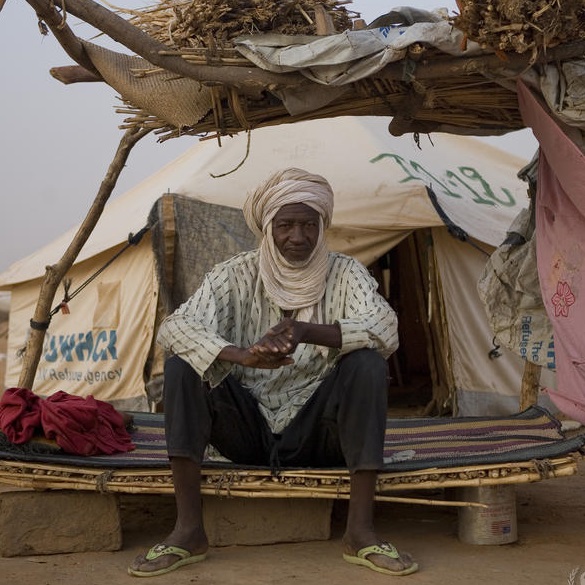Standardized Expanded Nutrition Survey - 2013, Refugee camps: Bahn, PTP, Solo and Little Wlebo
Liberia, 2013
Get MicrodataIdentification
UNHCR_LBR_SENS_2013
Standardized Expanded Nutrition Survey - 2013
Refugee camps: Bahn, PTP, Solo and Little Wlebo
| Name | Country code |
|---|---|
| Liberia | LBR |
Demographic and Health Survey [hh/dhs]
This was the second UNHCR SENS to be conducted in the camps since the Ivorian refugee emergency in 2010 in Liberia; the first was in 2012.
The UNHCR Standardized Expanded Nutrition Surveys (SENS) provide regular nutrition data that play a key role in delivering effective and timely interventions to ensure good nutritional outcomes among populations affected by forced displacement. This survey took place in the four Ivorian refugee camps (Bahn, PTP, Solo, and Little Wlebo) in Nimba, Grand Gedeh and Maryland Counties along the border with Cote d'Ivoire from November to December 2013. UNHCR and the World Food Programme (WFP) organized the survey in close collaboration with partners including Africa Humanitarian Action (AHA), International Refugee Committee (IRC), Merlin, Danish Refugee Council (DRC), CARE, and the Country Health Teams / Ministry of Health and Social Welfare of the Government of the Republic of Liberia. This was the second SENS to be conducted in the camps since the Ivorian refugee emergency in 2010 in Liberia; the first was in 2012.
Sample survey data [ssd]
Children 0-23 months
Children 6-59 months
Women 15-49 years
Households
Version
2021-06-11
Scope
- Children 0-23 months: feeding practices
- Children 6-59 months: prevalence of acute malnutrition, underweight, stunting and anaemia, coverage of vit A supplementation, and prevalence of diarrhoea
- Chidlren 9-59 months: coverage of measles vaccination
- Women 15-49 years: prevalence of anaemia
- Households: food security, mosquito net coverage and water, sanitation and hygiene information
| Topic |
|---|
| Health and Nutrition |
| Health |
| Water Sanitation Hygiene |
| Food security |
| Core Relief items (CRIs) |
| Malaria Prevention and Control |
Coverage
Maryland county (Little Wlebo refugee camp), Grand Gedeh county (Solo and PTP refugee camps), and Nimba county (Bahn refugee camp)
children 0-59 months
women 15-49 years
refugee households
Producers and sponsors
| Name |
|---|
| UNHCR |
Sampling
The UNHCR SENS guidelines for refugee populations and the Standardized Monitoring and Assessment of Relief and Transitions (SMART) methodology version 2 were used to calculate the required sample size. Information on nutritional status obtained from the 2012 nutrition survey was used for sample size estimation. The systematic random sampling methodology without list was used during sample size estimation since in each block households are well arranged in rows and columns.
From the 2012 survey, the upper limit of the global acute malnutrition according to WHO 2006 growth standards was 5.4%, which for the purpose of the 2013 survey the figure was rounded to 6% and assumed as an expected prevalence of acute malnutrition. Precision of 3% was desired and 10% to take care of non-response and absentees. The non-response rate was taken across in all camps due to the fact that the mobility among refugees in the amps is very high. The under-five population was below 10,000 and thus the need for adjustment to small population.
Based on November 2013's ProGres data, the estimated sample size was automatically generated from emergency nutrition assessment (ENA) software. More details available in the report.
During the survey, the sample size was adjusted in Little Wlebo and Bahn camps due to the fact that the non-response rate was higher than estimated.
Data are weighted by refugee camp and target population: children 0-59 months, women 15-49 years and households. Design weights included in datasets (see survey_weight).
Data collection
| Start | End |
|---|---|
| 2013-11-11 | 2013-12-13 |
| Name |
|---|
| United Nations High Commissioner for Refugees |
| World Food Programme |
Data processing
Household size above 10 in household-level modules top-coded to 10.
Data Access
| Name | |
|---|---|
| UNHCR | microdata@unhcr.org |
UNHCR (2021). Liberia: Standardized Expanded Nutrition Survey microdata, 2013. Accessed from: https://microdata.unhcr.org.
Contacts
| Name | Affiliation | |
|---|---|---|
| Data Curation Team | UNHCR | microdata@unhcr.org |
Metadata production
| Name |
|---|
| UNHCR |
2021-06-10
